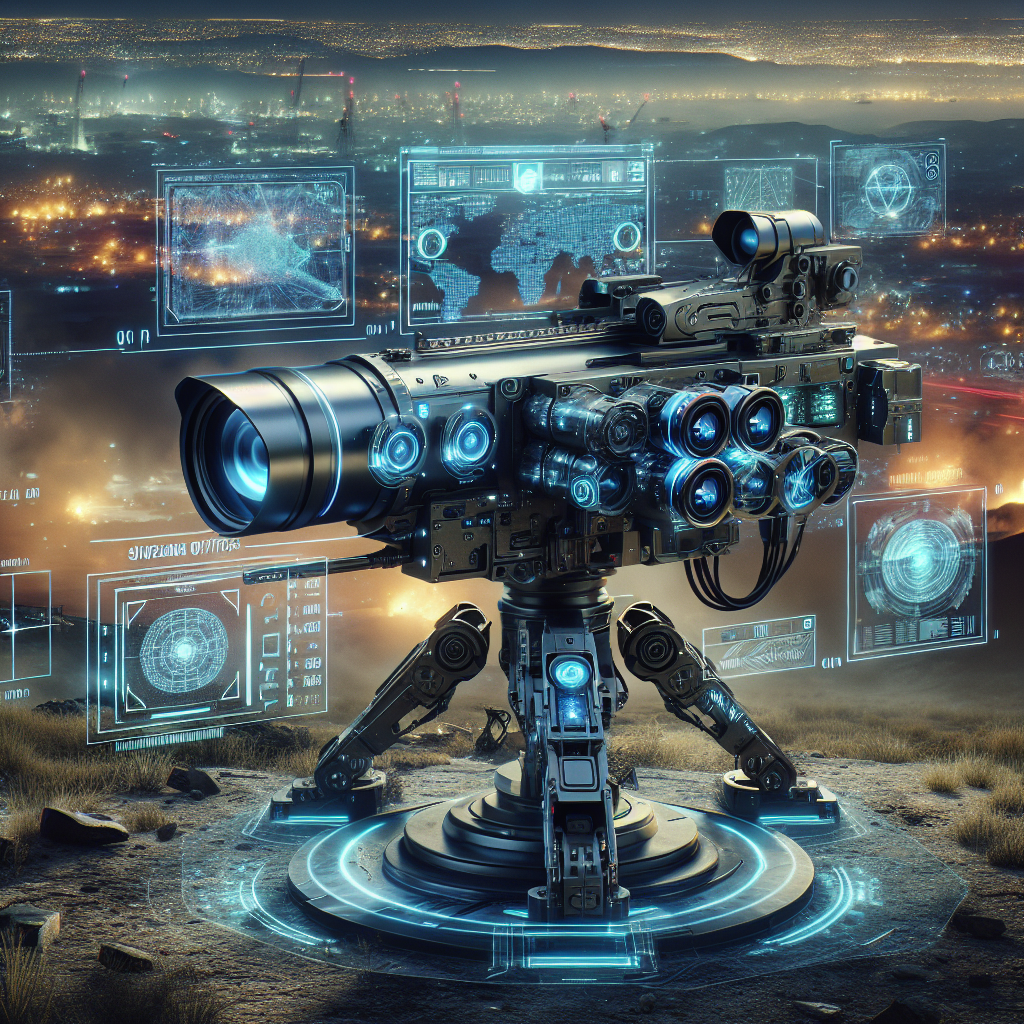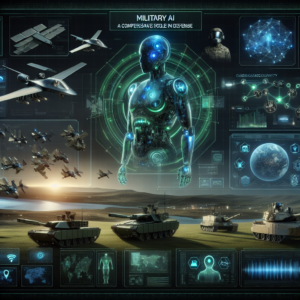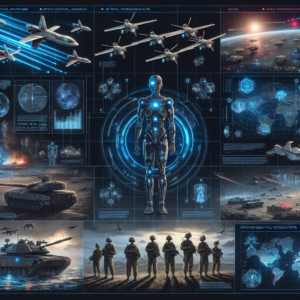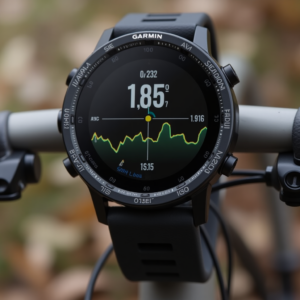
The Dawn of AI-Powered Weapons
The advent of AI-powered weapons signals a significant transformation in the landscape of modern warfare. AI, already integrated into multiple defense applications, is now being employed to develop autonomous weapons that have the potential to change the very nature of conflict. Among these weapons, the “AI machine gun” has garnered much attention. This weapon relies on AI technology to independently detect, identify, and engage targets, all without human intervention. As nations race to develop these systems, the future of warfare may be defined by the rise of intelligent, autonomous weaponry.
What Are AI-Powered Weapons?
AI-powered weapons are designed to operate autonomously, meaning they can execute tasks that would traditionally require human decision-making. These weapons use advanced algorithms and data-processing capabilities to detect threats, decide on the best course of action, and execute that action in real time. From AI-driven drones to autonomous machine guns, these systems promise faster decision-making and enhanced operational efficiency.
The primary purpose of these weapons is to increase accuracy, speed, and effectiveness in combat scenarios. In environments where split-second decisions are critical, AI-powered systems can outperform human operators, especially when under extreme pressure.
The Rise of the AI Machine Gun
The AI machine gun is an example of how AI is being directly integrated into weapons. These systems are designed to engage targets autonomously, with AI algorithms driving the entire process. AI-powered machine guns use data from sensors, cameras, and radar to identify and engage targets, often without any human involvement. Their primary role is to protect military assets, such as installations and vehicles, in hostile environments. These guns are already being tested in various military settings, with prototypes mounted on vehicles and used in perimeter defense roles.
While concerns about control and accountability exist, these systems offer potential advantages like reducing the exposure of human soldiers to danger and providing a higher rate of precision and efficiency in combat situations. However, as with all autonomous systems, AI machine guns raise significant ethical and operational questions.
Military AI: A Comprehensive Role in Defense
AI’s role in the military extends far beyond weapons. AI systems are increasingly being used to assist in intelligence analysis, decision-making, and planning. The ability of AI to quickly process and analyze large amounts of data allows for better battlefield awareness, faster decision-making, and optimized logistics.
Key applications of military AI include:
- Autonomous Combat Systems: These systems, including drones and autonomous vehicles, are designed to operate in dangerous environments with minimal human oversight.
- Data Analysis: AI can analyze vast amounts of battlefield data to help military leaders make informed decisions quickly.
- Cyber Defense: AI systems are crucial in defending against cyber-attacks, detecting threats, and counteracting them faster than traditional methods.
The integration of AI in military operations enhances the overall effectiveness of defense systems, making them smarter, faster, and more efficient.
The Benefits of AI in Military Defense
AI-powered systems offer several benefits to military operations:
- Speed and Precision: AI systems can process data and make decisions faster than human operators. This speed, combined with machine accuracy, enhances the effectiveness of military strikes.
- Reduced Human Casualties: Autonomous weapons, such as the AI machine gun, can take on dangerous tasks, such as perimeter defense or reconnaissance, reducing the need to place human soldiers in harm’s way.
- Cost Efficiency: AI systems, particularly autonomous machines, can reduce operational costs by requiring less maintenance and providing 24/7 operational capabilities.
- Adaptability: AI-powered systems improve over time through machine learning, making them more effective as they adapt to changing conditions and threats on the battlefield.
Ethical Considerations of AI Weapons
While AI-powered weapons promise efficiency, they also raise ethical questions. A key concern is accountability. If an AI system malfunctions or makes an erroneous decision, who is responsible? Is it the engineers who built the system, the military personnel who deployed it, or the AI itself? This lack of clear accountability is a major issue for policymakers, especially when it comes to ensuring compliance with international law and human rights standards.
Another concern is the potential misuse of AI in warfare. Autonomous weapons could be used in ways that escalate conflicts or undermine international stability. For instance, an AI machine gun could be deployed by a rogue state, or it could be used in non-combat situations to suppress civilian uprisings.
The risks associated with the potential autonomy of AI systems have prompted calls for international regulations governing their use. Many experts agree that while AI has immense potential, its deployment in military settings must be handled with extreme caution to avoid unintended consequences.
Leading Nations in AI-Powered Weapons Development
The United States, China, and Russia are at the forefront of AI-powered weapons research and development. Each country has its own strategy for integrating AI into its military infrastructure.
-
United States: The U.S. Department of Defense has been integrating AI into its systems for years. Through projects like Project Maven, which focuses on using AI for analyzing drone footage, the U.S. military is refining its use of AI in surveillance, reconnaissance, and combat. The U.S. also leads in developing autonomous weapons, including AI-driven drones and robotic systems.
-
China: China’s government is heavily investing in military AI research. Its military is using AI to enhance various combat operations, including the development of autonomous weapons. China’s focus is on creating advanced AI systems for both offensive and defensive military strategies.
-
Russia: Russia has been vocal about its intention to lead in military AI. It is focused on the development of AI for cyber warfare, autonomous ground systems, and intelligent weaponry. Russia sees AI as a means to gain a strategic advantage in future conflicts.
The Future of AI in Warfare
As AI technology continues to evolve, its integration into military systems will only deepen. The future could see fully autonomous battlegrounds, where AI-powered machines engage in combat alongside or even without human intervention. This scenario raises questions about the future role of human soldiers and the ethical implications of AI decisions in warfare.
While AI has the potential to revolutionize warfare, it also has the power to destabilize international relations. Governments will need to implement robust ethical frameworks, international treaties, and regulations to prevent the misuse of AI technologies. Moreover, as AI becomes more autonomous, ensuring that these systems act in accordance with international humanitarian law will become increasingly complex.
AI-powered weapons, such as the AI machine gun, are not just a part of science fiction—they are an emerging reality in modern military technology. These systems bring significant advantages in terms of speed, precision, and safety, but they also pose serious ethical, legal, and strategic challenges. As nations race to develop AI weapons, the international community must come together to establish frameworks that ensure these technologies are used responsibly and ethically. The future of warfare may very well be shaped by the machines we create—machines that are powered by artificial intelligence.
Visit our other website: https://synergypublish.com




